Charlottesville: What made Trump remarks so offensive?
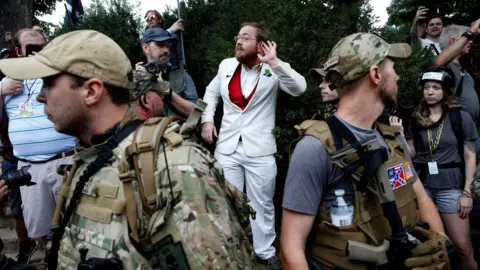 Reuters
ReutersPresident Trump has drawn condemnation for saying - for a second time - that both sides were to blame for violence in Charlottesville at the weekend. Why? What's so offensive?
Were both sides violent?
Yes, definitely. A BBC reporter at the scene saw men in bulletproof vests, armed with rifles, arrive to guard protesters at the Unite the Right march. He saw counter-protesters throwing bottles, rocks and paint at the right-wingers, and both sides using pepper spray.
Later that day a car drove through a group of counter-protesters, killing 32-year-old Heather Heyer and injuring 19 others. Attorney General Jeff Sessions later called it domestic terrorism. And a man charged in connection with the attack had been at the white supremacist rally.
So on the pure facts, Mr Trump is right in a way; both sides were violent, but the most violent attack of the day by far was carried out by a right-winger.
But weighing up the violence on both sides misses the point for many.
'No moral equivalency'
In a world where terrorist attacks, suicide bombs and extreme weather claim multiple lives, this was not the most violent incident of the year, the month or even the week. The violence in Charlottesville was notable not for the death toll or for the number of people injured, but for the clash of ideologies.
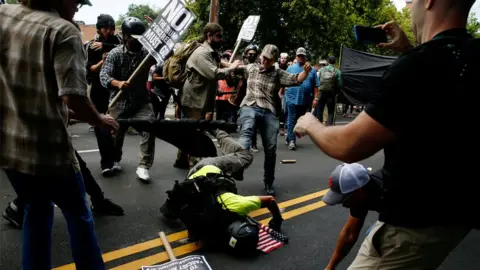 Reuters
ReutersThe left-wingers, including Ms Heyer, who died, were directing their protests against a show of strength from white nationalists.
That is: Hundreds of people showed their faces in public on Saturday to fight for the idea that people are better or worse than each other depending on their race. Counter-protesters showed up to fight against that idea.
Most of the criticism of Mr Trump's words has hinged on the suggestion that there is a similarity between the violence seen on both sides.
Republican Senator John McCain, a frequent critic of the president, tweeted: "There is no moral equivalency between racists & Americans standing up to defy hate & bigotry".
And a Twitter user compared the Unite the Right protesters to cancer and their opponents to chemotherapy.
Allow X content?
Shadow of the past?
The protesters in Charlottesville chanted "Jews will not replace us".
The president of a Jewish congregation in the city said armed men from the Unite the Right rally stood outside his synagogue during the protest, and when protesters passed they shouted "Sieg Heil" and other Nazi phrases.
These stories carry uncomfortable echoes of the most obvious warning from history: World War Two, in which Nazis murdered millions of people, many of them in expressly-built extermination camps, for being Jewish, for being gay or disabled or Roma or for political dissent against the Nazis' plans for European domination. Six million Jews were killed by the Nazis, and they aimed to wipe out European Jewry.
Karen Pollock from the Holocaust Educational Trust said: "The Holocaust did not start with the gas chambers, it started with words; with hate-filled rhetoric.
"To therefore see neo-Nazi, racist and anti-Semitic symbols and language used in Charlottesville should shock and horrify all of us. Such hate has no place in our society and we all have a responsibility to act wherever it rears its head."
Holocaust survivor 'astonished'
Gena Tugel, 94, survived the Krakow ghetto, a labour camp, and three concentration camps including Auschwitz. She told the BBC she was "just really astonished" and "speechless" to see the march in Charlottesville.
"I thought Americans are wonderful people, I never expected to hear that Nazis are there," she said.
"I was very very surprised. I'm not worried about myself, I'm worried about my children and grandchildren. That something like that will occur again and in America out of all the countries.
"I'm just really astonished and I do fear and pray that it will never occur again."
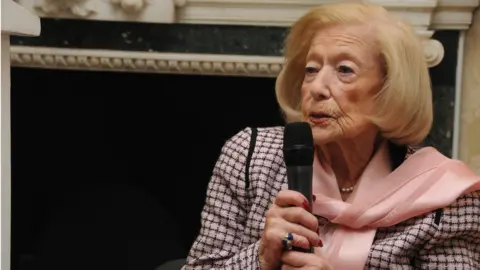 Handout
HandoutAsked if she had a message for the Unite the Right protesters, she said: "I would tell them they should wake up and find something better to do than raise violence for no reason. They should do some work and earn some good living and help others.
"Peace should come all over the world, for us and others, and tomorrow and today, generations to come."
She was not the only Holocaust survivor to comment on the Charlottesville incident. Marianne Rubin, 89, attended a protest in New York City, carrying a sign reading "You will not defeat me now". She told a reporter she feared "the next one".
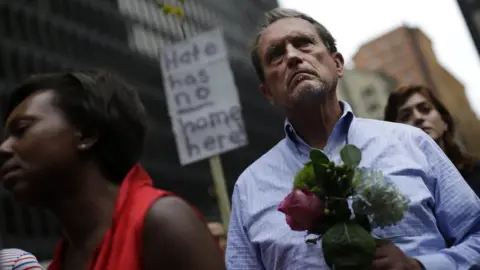 AFP
AFPWho condemned what Trump said?
A whole host of people have condemned the "both sides" narrative that Mr Trump has given twice now. Interestingly many voices of condemnation have come from within his own party.
Allow X content?
Allow X content?
Allow X content?
Allow X content?
Molly Kiniry of Republicans Overseas UK told the BBC World News TV channel: "It's quite dangerous to suggest that the protesters on the left including the woman who tragically died somehow had it coming or that they invited this upon themselves. Nothing could be further from the truth.
"We have a set of groups who are advocating for white nationalism, for the supremacy of white groups in America and for policies that would enshrine that hateful ideology in law, and we have those simply trying to drown out their voices. There can be no comparison between those groups."
Has anyone come out in favour of his words?
Yes, a small fraction, most notably former Ku Klux Klan leader David Duke and the spokeswoman of the Republican National Committee.
Allow X content?
Allow X content?
And Jessie Jane Duff from the New York-based London Center for Policy Research told the BBC World channel: "[Mr Trump] did not say both sides were equally to blame. He made it very clear that people came to oppose and although many of them were peaceful there were people with bats coming and swinging and fighting."
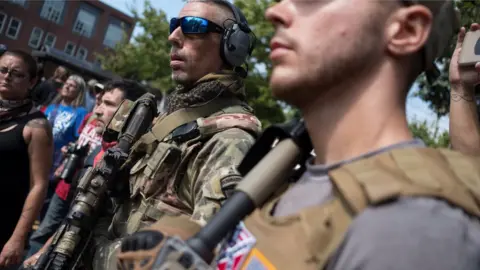 Reuters
Reuters